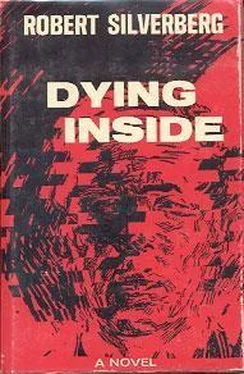Somewhere about 180th Street I look up and see a girl sitting diagonally opposite me and apparently studying me. She is in her very early twenties, attractive in a sallow way, with long legs, decent breasts, a bush of auburn hair. She has a book too—the paperback of Ulysses, I recognize the cover—but it lies neglected on her lap. Is she interested in me? I am not reading her mind; when I entered the train I automatically stopped my inputs down to the minimum, a trick I learned when I was a child. If I don’t insulate myself against scatter-shot crowd-noises on trains or in other enclosed public places I can’t concentrate at all. Without attempting to detect her signals, I speculate on what she’s thinking about me, playing a game I often play. How intelligent he looks. . . . He must have suffered a good deal, his face is so much older than his body . . . tenderness in his eyes . . . so sad they look . . . a poet, a scholar. . . . I bet he’s very passionate . . . pouring all his pent-up love into the physical act, into screwing. . . . What’s he reading? Beckett? Yes, a poet, a novelist, he must be . . . maybe somebody famous. . . . I mustn’t be too aggressive, though. He’ll be turned off by pushiness. A shy smile, that’ll catch him. . . . One thing leads to another. . . . I’ll invite him up for lunch. . . . Then, to check on the accuracy of my intuitive perceptions, I tune in on her mind. At first there is no signal. My damnable waning powers betraying me again! But then it comes—static, first, as I get the low-level muzzy ruminations of all the passengers around me, and then the clear sweet tone of her soul. She is thinking about a karate class she will attend later this morning on 96th Street. She is in love with her instructor, a brawny pockmarked Japanese. She will see him tonight. Dimly through her mind swims the memory of the taste of sake and the image of his powerful naked body rearing above her. There is nothing in her mind about me. I am simply part of the scenery, like the map of the subway system on the wall above my head. Selig, your egocentricity kills you every time. I note that she does indeed wear a shy smile now, but it is not for me, and when she sees me staring at her the smile vanishes abruptly. I return my attention to my book.
The train treats me to a long sweaty unscheduled halt in the tunnel between stations north of 137th Street; eventually it gets going again and deposits me at 116th Street, Columbia University. I climbed toward the sunlight. I first climbed these stairs a full quarter of a century ago, October ‘51, a terrified high-school senior with acne and a crew-cut, coming out of Brooklyn for my college entrance interview. Under the bright lights in University Hall. The interviewer terribly poised, mature—why, he must have been 24, 25 years old. They let me into their college, anyway. And then this was my subway station every day, beginning in September ‘52 and continuing until I finally got away from home and moved up close to the campus. In those days there was an old cast-iron kiosk at street level marking the entrance to the depths; it was positioned between two lanes of traffic, and students, their absent minds full of Kierkegaard and Sophocles and Fitzgerald, were forever stepping in front of cars and getting killed. Now the kiosk is gone and the subway entrances are placed more rationally, on the sidewalks.
I walk along 116th Street. To my right, the broad greensward of South Field; to my left, the shallow steps rising to Low Library. I remember South Field when it was an athletic field in the middle of the campus: brown dirt, basepaths, fence. My freshman year I played softball there. We’d go to the lockers in University Hall to change, and then, wearing sneakers, polo shirts, dingy gray shorts, feeling naked amidst the other students in business suits or ROTC uniforms, we’d sprint down the endless steps to South Field for an hour of outdoor activity. I was good at softball. Not much muscle, but quick reflexes and a good eye, and I had the advantage of knowing what was on the pitcher’s mind. He’d stand there thinking, This guy’s too skinny to hit, I’ll give him a high fast one, and I’d be ready for it and bust it out into left field, circling the bases before anyone knew what was happening. Or the other side would try some clumsy bit of strategy like hit-and-run, and I’d move effortlessly over to gather up the grounder and start the double play. Of course it was only softball and my classmates were mostly pudgy dubs who couldn’t even run, let alone read minds, but I enjoyed the unfamiliar sensation of being an outstanding athlete and indulged in fantasies of playing shortstop for the Dodgers. The Brooklyn Dodgers, remember? In my sophomore year they ripped up South Field and turned it into a fine grassy showplace divided by a paved promenade, in honor of the University’s 200th birthday. Which happened in 1954. Christ, so very long ago. I grow old . . . I grow old . . . I shall wear the bottoms of my trousers rolled. The mermaids singing, each to each. I do not think that they will sing to me.
I go up the steps and take a seat about fifteen feet to the left of the bronze statue of Alma Mater. This is my office in fair weather or foul. The students know where to look for me, and when I’m there the word quickly spreads. There are five or six other people who provide the service I provide—impecunious graduate students, mostly, down on their luck—but I’m the quickest and most reliable, and I have an enthusiastic following. Today, though, business gets off to a slow start. I sit for twenty minutes, fidgeting, peering into Beckett, staring at Alma Mater. Some years ago a radical bomber blew a hole in her side, but there’s no sign of the damage now. I remember being shocked at the news, and then shocked at being shocked—why should I give a damn about a dumb statue symbolic of a dumb school? That was about 1969, I guess. Back in the Neolithic.
“Mr. Selig?”
Big brawny jock looming above me. Colossal shoulders, chubby innocent face. He’s deeply embarrassed. He’s taking Comp Lit 18 and needs a paper fast, on the novels of Kafka, which he hasn’t read. (This is the football season; he’s the starting halfback and he’s very very busy.) I tell him the terms and he hastily agrees. While he stands there I covertly take a reading of him, getting the measure of his intelligence, his probable vocabulary, his style. He’s smarter than he appears. Most of them are. They could write their own papers well enough if they only had the time. I make notes, setting down my quick impressions of him, and he goes away happy. After that, trade is brisk: he sends a fraternity brother, the brother sends a friend, the friend sends one of his fraternity brothers, a different fraternity, and the daisy-chain lengthens until by early afternoon I find I’ve taken on all the work I can handle. I know my capacity. So all is well. I’ll eat regularly for two or three weeks, without having to tap my sister’s grudging generosity. Judith will be pleased not to hear from me. Home, now, to begin my ghostly tasks. I’m good—glib, earnest, profound in a convincingly sophomoric way—and I can vary my styles. I know my way around literature, psychology, anthropology, philosophy, all the soft subjects. Thank God I kept my own term papers; even after twenty-odd years they can still be mined. I charge $3.50 a typed page, sometimes more if my probing reveals that the client has money. A minimum grade of B+ guaranteed or there’s no fee. I’ve never had to make a refund.
When he was seven and a half years old and causing a great deal of trouble for his third-grade teacher, they sent little David to the school psychiatrist, Dr. Hittner, for an examination. The school was an expensive private one on a quiet leafy street in the Park Slope section of Brooklyn; its orientation was socialist-progressive, with a smarmy pedagogical underpinning of warmed-over Marxism and Freudianism and John Deweyism, and the psychiatrist, a specialist in the disturbances of middle-class children, paid a call every Wednesday afternoon to peer into the soul of the current problem child. Now it was David’s turn. His parents gave their consent, of course. They were deeply concerned about his behavior. Everyone agreed that he was a brilliant child: he was extraordinarily precocious, with a reading-comprehension score on the twelve-year-old level, and adults found him almost frighteningly bright. But he was uncontrollable in class, raucous, disrespectful; the schoolwork, hopelessly elementary for him, bored him to desperation; his only friends were the class misfits, whom he persecuted cruelly; most of the children hated him and the teachers feared his unpredictability. One day he had up-ended a hallway fire extinguisher simply to see if it would spray foam as promised. It did. He brought garter snakes to school and let them loose in the auditorium. He mimed classmates and even teachers with vicious accuracy. “Dr. Hittner would just like to have a little chat with you,” his mother told him. “He’s heard you’re a very special boy and he’d like to get to know you better.” David resisted, kicking up a great fuss over the psychiatrist’s name. “Hitler? Hitler? I don’t want to talk to Hitler!” It was the fall of 1942 and the childish pun was an inevitable one, but he clung to it with irritating stubbornness. “Dr. Hitler wants to see me. Dr. Hitler wants to get to know me.” And his mother said, “No, Duvid, it’s Hittner, Hittner, with an n.” He went anyway. He strutted into the psychiatrist’s office, and when Dr. Hittner smiled benignly and said, “Hello, there, David,” David shot forth a stiff arm and snapped: “Heil!”
Читать дальше












